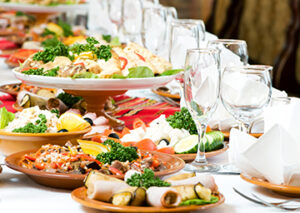Caterers provide food services at various locations. Whether it’s at a wedding, corporate event, or an event at a remote site, a caterer will be able to serve the food and drink needs of the guests. Read on to find out more about the job description, skills required, and costs.

The job description for a caterer includes a range of tasks, including designing the menu, sourcing ingredients, and preparing the food. In addition, catering jobs require workers to ensure food safety and sanitation. They may also be responsible for helping with event setup and take down. They also maintain tables and serving stations according to client specifications.
While a job description for a caterer may vary from organization to organization, the essential elements should be the same. The role requires a person with excellent interpersonal skills and a positive attitude. Catering job descriptions should also include a call to action that directs job seekers to submit their resumes or application.
A caterer is responsible for creating and preparing bulk food orders, and setting up and serving the food at events. They also must coordinate with clients to create menus that are appropriate for the number of guests and the event’s schedule. They also need to consider dietary restrictions and follow industry standards. A caterer must have excellent communication skills and be detail oriented to be successful.
As a caterer, you need to be detail-oriented, have excellent interpersonal relations skills, and be creative. In addition, you must have excellent communication and organization skills. You must also be able to handle pressure and work well in a team. A caterer’s job description also includes ensuring food is served promptly.
Caterers typically have a few years of experience. They may have gained this experience through an internship or by working at a restaurant. A Caterer’s resume should showcase strong food preparation and customer service skills, and experience supervising others is always an asset.
As a catering professional, it’s important to have the necessary skills to manage a busy schedule and work under pressure. This job requires a lot of planning, preparation, and attention to detail. For example, you must have an excellent eye for food presentation and organization. You should also have a strong knowledge of cooking and the different types of ingredients that are used in food preparation.
Apart from cooking skills, caterers must also have excellent communication and interpersonal skills. They must be able to plan menus and know the appropriate food pairings. Also, they should know how to transport food to the event location. And last but not least, they must be skilled in arranging and handling a large number of employees.
Another skill that caterers need is the ability to serve. They must be able to set tables properly so that their clients can enjoy a great dining experience. This involves knowing how to use knives, silverware, and other kitchen tools. They must also be able to maintain a clean work area.
In addition to these skills, a catering job requires someone who can work well under pressure. Having previous experience in a kitchen is beneficial. Most employers do not require formal qualifications, but supervised training is usually provided on the job. However, a food hygiene certificate or secondary qualifications can enhance your chances of employment.
Before you become a catering professional, you should consider learning as much as you can about the job. First, you should know what a service area is. You should know how to prepare the dishes and the menu in a professional manner.
Catering is often an expensive process, so it is essential to know how much you can expect to pay before you order. In general, caterers charge per person for the food and beverages they serve, and the overall cost of the service will include labor and rental products. You can also ask the catering company for an estimate for any additional items you want.
Costs of catering are based on a number of factors, including the number of guests and the type of event. The higher the number of people, the more expensive the food will be. For example, a party with a hundred guests will cost around $25 per plate, whereas a party with only a few guests may cost around $10 to $12.
In addition to the food itself, catering companies will also provide servers, bartenders, and chefs. If you want in-kitchen chefs, these services will add $150 to $200 to the total price. Regardless of the style of your event, you should be aware that some caterers charge a gratuity of 18 percent, which is a standard in the industry.
You can also visit our other websites and post your article.
My Journey, Optimist Club, Acinm, Minimum Wage, Icon Servatory, Southern Independence, Chameleon 2000, Georgia Job, Auction Search, Internet Business Skill, Mississippi Injury, HCCH Judgments, Is Minerva, Lacrosse Home Inspector, Swiss Asia, We Back Biotech, Vote by Mail Project, Get Nate Home, SW LAW, The 17 Grace, Best HighOscar Sisto, Valley Animal, A1 Computer, Strutting In Style In My New Ride, Shadow Acre, APPLESGATE DELI – MARKET AND INTELLIGENCE, N1RCT, Madisle, Your Last Business Venture, Work of a Census Profiler, Eugene Web Design, Creative Concrete, Sally Spicer, Benefit Corporation, Discount Home Decor, Straits Business, Sing For Water, Seniors United, I Am 2135
